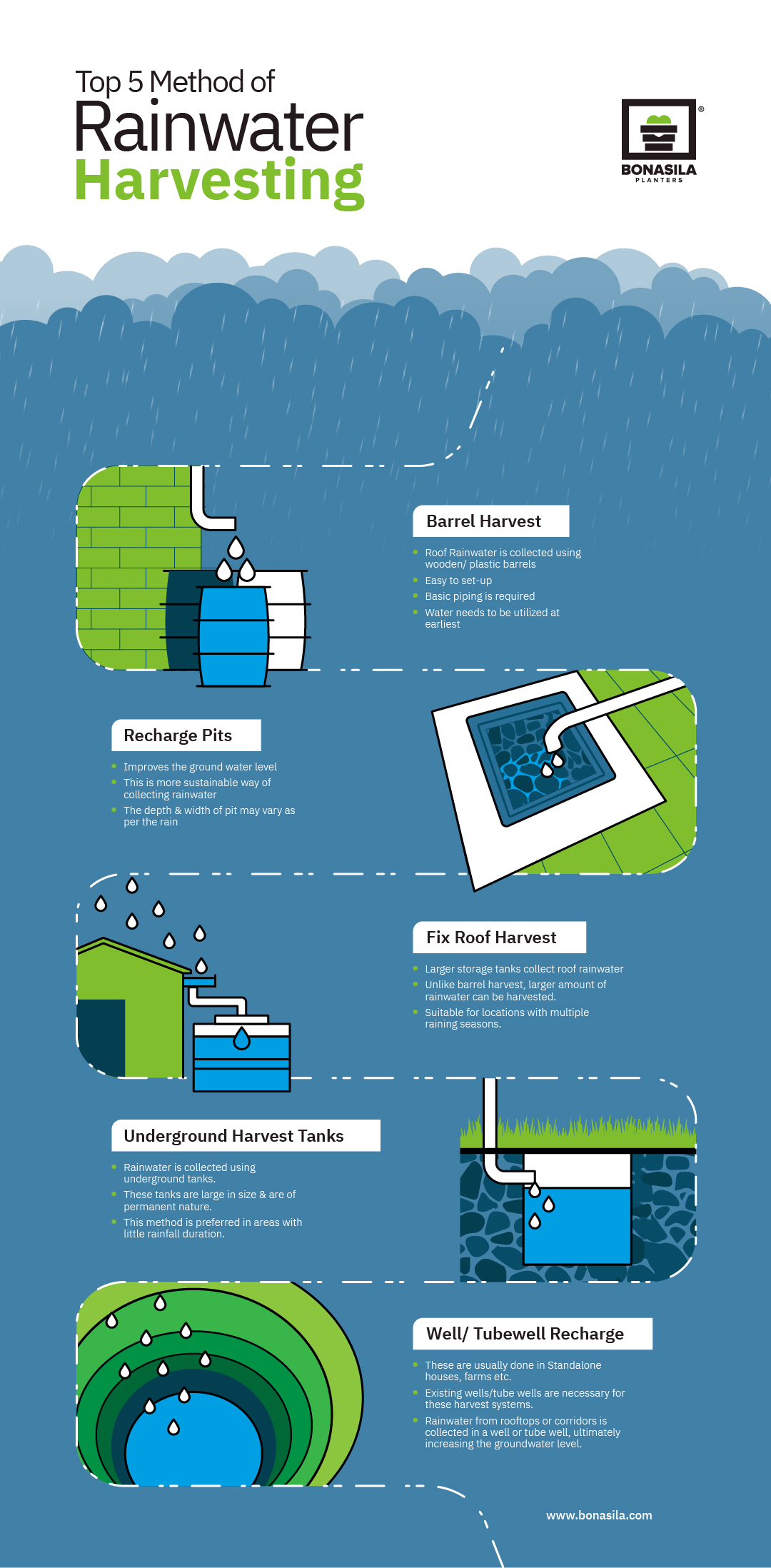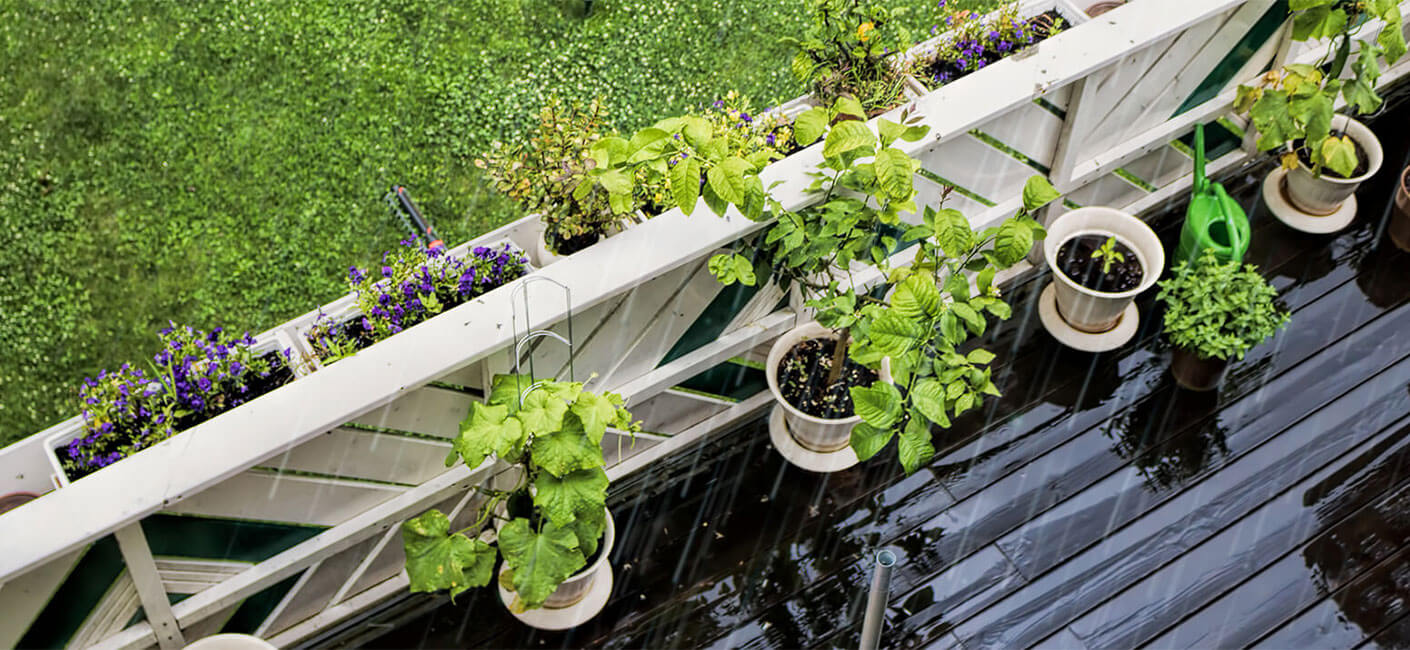With the monsoon in its full glory, the beauty of nature flourishes as the rainwater washes down the dust and frees the nutrients and minerals that foster plant growth making them healthier. Monsoon is the best season for nature and hence, it is considered to be the perfect time to plant trees as they grow faster. Also, the most suitable atmosphere and more importantly the fresh rainwater is responsible for the plants and trees to look greener, fresher, cleaner and lusher in the monsoon.
If you have a garden in your patio or backyard or have plants in your house, it is recommended that you make the best of this season by utilizing the rainwater to reenergize and refresh your plants. When outdoor planting doesn’t require an extra effort, if you are planting indoors, you can store rainwater and use it to water your indoor plants. Here are some important benefits of using rainwater for your indoor garden.
Is Rain Water Good for Plants? Here’s Benefits of Using Rainwater in an Indoor Garden :
1. Rainwater is Soft water and hence, safe for plants.
Unlike tap water, rainwater does not contain salts, minerals, treatment chemicals as rainwater is pure hydration. Even the groundwater and surface water can be contaminated or have chemicals that are built up in the soil over time which makes the groundwater not only harmful but also useless for plants. In addition, watering plants with tap water or groundwater can be more harmful, as the chemicals are soaked in the soil and have no space to spread like they can in the natural plant beds.
2. Rainwater matches the right pH needed for plants to grow.
As we know, rainwater is a little acidic putting it on the right pH scale, around pH 7. The ideal pH range for plants to grow is 5.5 to 6.5. Now, tap water and groundwater often have a pH range ranging from 8.5 to 10.5 which makes it very harmful for the plants. However, when used with rainwater, it can balance the pH bringing it to the neutral range. Rainwater can be used to flush out the chemicals in the soil, bringing soil to the ideal pH range.
3. Rainwater contains essential components.
Rainwater contains macro-nutrients that are the most useful form of nitrogen that fosters the plant growth. Some forms of nitrogen cannot be absorbed which makes it difficult to provide the right nutrients easily. Since nitrogen is the key component responsible for the health and growth of the plant, receiving nitrates directly from rainwater can help you grow your indoor plants more rapidly than ever.
4. Rainwater frees essential elements in the soil for plants to thrive.
With rainwater soaking the soil, the nutrients and minerals present inside are freed so that the roots can easily absorb them and grow faster. This may be easier for the plants grown outside in the flowerbeds but plants grown indoors do not get rainwater easily unless they are placed on the terrace or in the balconies.
To ensure that the trees you plant in large planters as well as the plants in small indoor plant pots get same nutrients and water to thrive, you can implement rainwater irrigation systems for them to grow at a rapid pace.
Also Read: 5 plants you can grow using large planters
5. Rainwater is easy to access and store.
With small rainwater irrigation system or rain barrels, you can easily store rainwater that you can not only use for watering your plants but also in the household chores like cleaning toilets, washing clothes and dishes, showering and even cooking. By utilizing the available rainwater in the best ways possible, you are also saving water as it is a step towards an eco-friendly and sustainable lifestyle.

6. It is a smart way to optimise water usage
When you use rainwater to water your plants, you have the choice to bring down the dependence on tap water, saving it for future use. This minor change in your everyday life can bring down the carbon footprint without anyone even noticing. Yes, just go for it.
7. Rainwater unlocks micro-nutrients
Rainwater consists of the required amount of carbon, which helps to unlock the micro-nutrients present in the soil around the plants. These micro-nutrients can be Zinc, Manganese, Copper and Magnesium. These necessary micro-nutrients aid in the rapid growth of plants.
8. Rainwater avoids chlorine toxicity for plants
It’s very likely that the tap water may consist of small amounts of fluoride & chlorine, which is used in the purification processes. This water may affect the plants. However, Rainwater is free from these chemical impurities. Thus, when plants are watered with rainwater they are prevented from the potential toxicity of chlorine and fluoride.
9. Plants grow greener with Rainwater
Nitrate, which is naturally present in the rainwater, is a great source of Nitrogen for plants. Nitrogen is among the top nutrient elements that are required for plant growth. Thus, plants grow greener when they are watered with rainwater.
Looking for large planters that suit your décor theme?
Designer FRP planters by Bonasila are thoughtfully designed and have 35 designs for you to choose from. They have a wide range of colours, shapes and sizes that makes it possible for you to decorate your indoors in your style and make them complement your interior decor. These planters are suitable for both indoor and outdoor uses. Explore and choose the planter that suits your design theme the best.
FAQ’s
Should you collect rainwater for indoor plants?
In the rainy season, a huge amount of rainwater simply flows down the drain. A very small proportion of this rainwater actually recharges the groundwater level. Utilizing this rainwater for your indoor & outdoor plants can reduce the dependency on water from your usual water source.
What nutrients are in rainwater?
Nitrogen is one of the important elements that is required for the plant’s growth. Rainwater consists of nitrates in natural form. These help in the natural growth of plants. Secondly, if you are collecting the rainwater fallen on your rooftop, it also contains some amount of organic matter. These nutrients are helpful in the plant’s growth.
Does rainwater make plants grow faster?
Many plants & gardening enthusiasts believe that the plants that are exposed to rainwater are happier. Rainwater is a natural phenomenon and it does help in the growth of plants. A plant that gets rainwater exposure is likely to grow faster than indoor plants.
How long can you store rainwater for indoor plants?
Rainwater that is stored well, can stay in a good condition for a really long time. There are a few precautions that you need to take so that this water doesn’t become a breeding ground for mosquitoes or any sort of algae.
How do you collect rainwater for plants without gutters?
The simplest way to collect the rainwater is to use containers. However, these containers can be a temporary solution as you will need to use this water as earliest as possible. If your area receives a good amount of rain, you can consider using pre-fabricated tanks. With a basic piping arrangement, you can collect the roof rainwater into these tasks.
